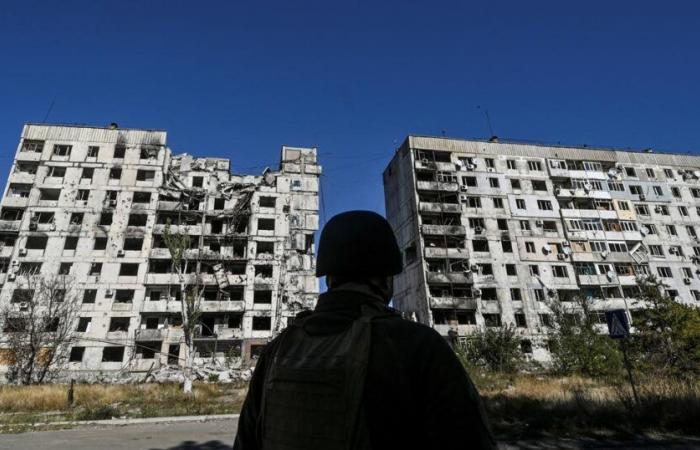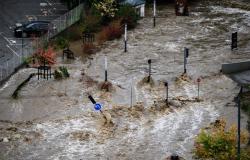Pyongyang has sent thousands of troops to the Ukrainian front, according to South Korean and Ukrainian sources. Unsurprisingly, Moscow denies this, but beyond that, information varies as to the number and role of these soldiers.
Since the beginning of October, numerous Ukrainian and South Korean sources have mentioned the sending of North Korean troops to Russia and Ukraine to lend a hand to the Russian army. If there is no formal and authenticated proof to date of this involvement which would be major, Le Figaro summarizes the progress of this hypothesis which is reinforced day after day. In particular, how many North Korean soldiers are we talking about? Where would they be deployed? When ? And what would their role be?
Early June: first statements on the presence of North Korean soldiers
In June, the first reports on Ukrainian Telegram channels indicated – without visual proof – the presence of North Koreans in Russia, while at the same time, a North Korean armor used by the Russian army was seen on a field of battle in the Kharkiv region of Ukraine.
In the process, Major General Pat Ryder, spokesperson for the Pentagon, ensures that the United States is closely monitoring these developments. “If I were in charge of North Korean military forces, I would question the choice to send them to serve as cannon fodder in an illegal war against Ukraine”he announced on June 25, assuring “keep an eye” on the future actions of the two countries.
June 18: Putin in Pyongyang
On June 18, images went around the world: North Korean leader Kim Jong-un and Russian President Vladimir Putin signed a mutual defense pact, and rumors emerged of a defense agreement providing for troop support .
The North Korean dictator notably expressed his “total” support in the war against Ukraine. In the process, Western countries, led by the United States, accused North Korea of having sent large quantities of munitions, including artillery shells, to Russia. In exchange, Moscow would provide its expertise for the Hermit Kingdom’s satellite program. After the delivery of ammunition, Kim Jong-un’s regime delivered KN-23 ballistic missiles, which were used as early as last winter, according to Ukrainian media.
”
data-script=”https://static.lefigaro.fr/widget-video/short-ttl/video/index.js”
>
Also read
Vladimir Putin seeking North Korean help for his war in Ukraine
July: cautious confirmation from the South Koreans on the presence of engineering units
In early July, South Korean intelligence services confirmed that “thousands of soldiers” North Koreans are participating in the reconstruction of destroyed cities in Ukraine in areas occupied by Russian forces. At that time, the figure of four brigades of these engineering units, or around 12,000 North Koreans, was already put forward, but these were not combat forces.
October 6: six North Korean officers killed by a Ukrainian strike?
The question of sending North Korean troops to Ukraine accelerates in early October. On October 6, the Ukrainian agency Interfax claimed that six North Korean officers died during a Ukrainian missile attack that occurred a few days earlier near Donetsk, in eastern Ukraine occupied by Moscow.
Andriï Kovalenko, an official of the Ukrainian National Security and Defense Council, specifies on Telegram that the North Korean soldiers engaged in Ukraine “limited to a small number of engineering troops”. Ces forces “monitor the use of (North Korean) munitions by the Russian army”he adds, affirming that “Russia is increasingly dependent on ammunition from North Korea for different types of weapons”.
October 8: South Koreans support the information, Russians deny
On October 8, South Korean Defense Minister Kim Yong-hyun declares that Seoul judges “very likely that there were casualties among North Korean officers and soldiers in Ukraine”even saying he expected other troops to be sent to reinforce the Russians.
For its part, the Kremlin describes October 10 as “false” information coming from kyiv and Seoul. “This looks like new (false) information, a canard”sweeps away the spokesperson for the Russian presidency, Dmitri Peskov, during his daily briefing.
October 11: thousands of infantry soldiers in training in Russia?
The possible presence of infantry soldiers was first mentioned by the Washington Post . According to the article in the American daily published on October 11, “several thousand” of North Korean infantry soldiers are currently participating in training on Russian soil and could be deployed to the front in Ukraine by the end of this year.
According to a Ukrainian military intelligence official cited by our colleagues, North Korean officers are already on the ground in Ukraine occupied by Russia, even if none of them has yet participated directly in the fighting. The American daily raises the hypothesis in which North Korean soldiers could replace Russian soldiers positioned on the borders, which would allow Moscow to increase troops on the Ukrainian front and create an imbalance of forces.
This information was confirmed on October 15 by an anonymous Western diplomat at Kyiv Independantwithout however specifying the type of soldiers or their role.
October 13: Zelensky denounces “North Korea’s real involvement in the war”
On October 13, Volodymyr Zelensky seized on this first information and declared that the Russian invasion plan this fall would include “North Korea’s actual involvement in the war”. A few days later, on the 17th, the Ukrainian president said “only 10,000 North Korean soldiers” are preparing to fight the Ukrainian army alongside Russian forces and talks about “first step towards a world war”.
For Ukrainian President Vladimir Putin “attempts to involve” other parts “in this war” due to “heavy losses” suffered by the Russian army and because he “fear of mobilization” which would be unpopular. The Ukrainian head of state also ensures that he has information from “intelligence services” Ukrainians according to which North Korean officers are already in the zone occupied in Ukraine by the Russians.
October 16: American skepticism
In the process, the Americans calm things down: intelligence and army officials report “of their skepticism in the face of Ukrainian assertions”according to the New York Times precisely recalling that “neither Ukraine nor South Korea has presented evidence of the presence of North Korean troops”.
“We have no evidence that North Korean soldiers are taking part in the fighting but we know that North Korea supports Russia”NATO Secretary General Mark Rutte reacted cautiously on Thursday evening.
Yves Herman / REUTERS
October 17: 11,000 soldiers ready to fight?
Kyrylo Budanov, head of Ukrainian military intelligence, announced a new figure Thursday evening: in total, nearly 11,000 North Korean soldiers are present in Russia and would be “ready to fight” in Ukraine by November 1, in comments relayed by the Kyiv Independent. The general goes even further by specifying that a “first group of 2,600 soldiers will be deployed to Kursk Oblast, Russia”. The very location of the counterattack led by the Ukrainians in August.
October 18: “up to 12,000”?
The South Korean National Intelligence Service (NIS) affirmed this Friday, October 18, that North Korea decided to send “up to 12,000 soldiers” to help Russia. Pyongyang’s growing support for Moscow’s war in Ukraine, which will “beyond the transfer of military equipment and translates into troop deployments”represents “a significant threat to the security not only of our country but also of the international community”said the South Korean presidency in a press release.
“A second transport operation should take place shortly”added the NIS which assured Friday that North Korea had “provided Russia with the equivalent of more than 13,000 containers of artillery ammunition, missiles, anti-tank rockets and other lethal weapons” since August.
…and first visual evidence?
The NIS also released detailed satellite images this Friday showing, according to it, the first deployment of these soldiers. He explains having “detected from October 8 to 13 that North Korea transported its special forces to Russia in a Russian navy transport ship, confirming the start of North Korea’s military participation” in the war against Ukraine.
Also according to the NIS, several Russian landing ships and frigates have already completed the transport of the first contingent of North Korean troops, who are currently stationed at military bases in the Russian Far East. The soldiers were sent to bases including “in Vladivostok, Ussuriysk, Khabarovsk and Blagoveshchensk, and are expected to be deployed to the front lines as soon as they have completed their training” acclimatization, South Korea’s National Intelligence Service said in a statement.
These soldiers “should be deployed to the front lines (of the Ukrainian conflict) as soon as they have completed their acclimatization training”South Korean intelligence said. “This appears to be an attempt to hide the fact that they are North Korean soldiers by passing them off as Russian soldiers.”accused the NIS. The Associated Press agency nevertheless specifies that the “assessment” of the NIS is “mixed” on developments in North Korea because it is “one of the most secretive countries in the world”.
Cascading international reactions
JOHN MACDOUGALL / REUTERS
After Seoul’s announcements, reactions followed one another on the international scene. “North Korea’s increasing cross-cooperation and military support for the Russian war effort in Ukraine are very worrying”declared Christophe Lemoine, spokesperson for the French Ministry of Foreign Affairs. British Prime Minister Keir Starmer sees “the level of despair” on the side of Moscow, and that “Russia is weakening”. China, an ally of Pyongyang and Moscow, reiterated its hope for a “de-escalation” a Ukraine.
If NATO cannot confirm “at this stage” information from Seoul, Ukrainian diplomacy took the opportunity to demand a strong reaction from its allies and an acceleration of Western military support. “North Korea supports Russia’s aggression against Ukraine with weapons and manpower. (…) We demand an immediate and strong reaction from the Euro-Atlantic community and the world”Ukrainian Foreign Minister Andriï Sybiga wrote on X, calling in particular on the West to lift restrictions on the use of long-range weapons and to “intercept” Russian missile and drone attacks on Ukrainian territory.






